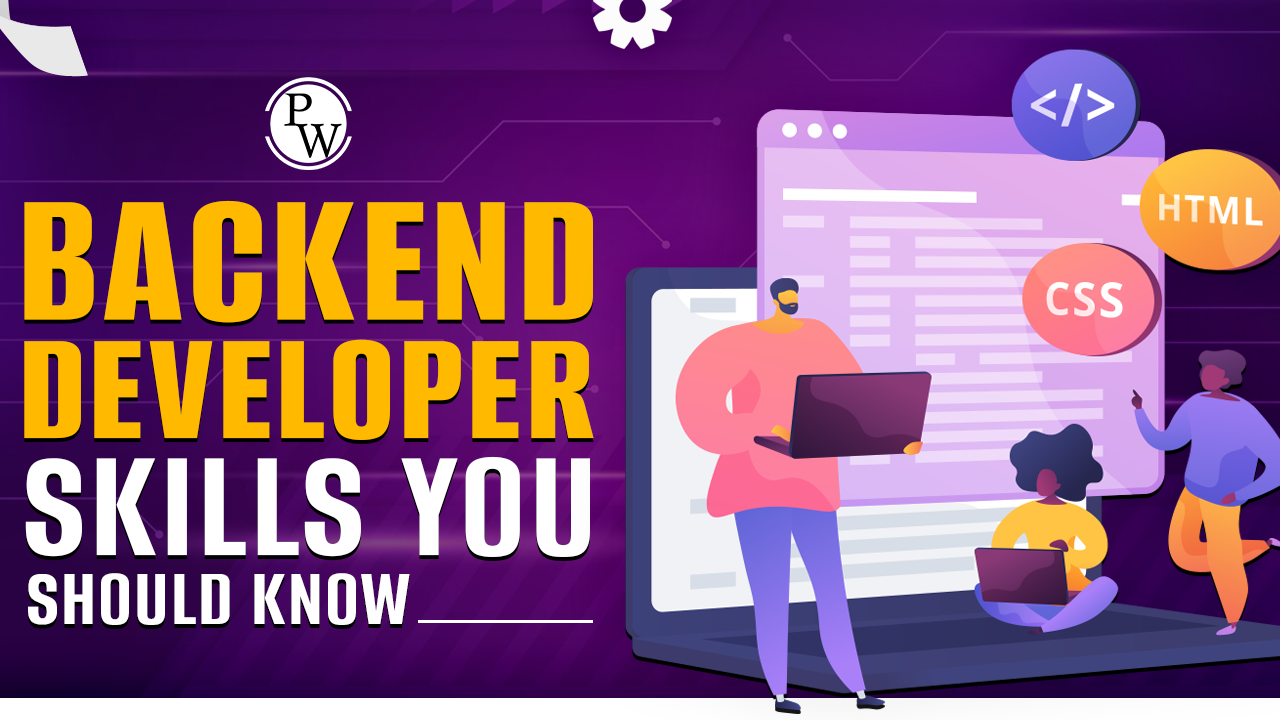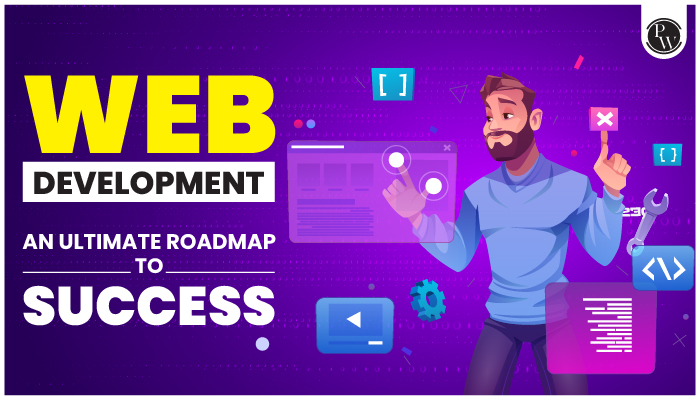Backend Developer Skills: Backend development forms the backbone of every web application and software system. It works behind the scenes to ensure that the front end, the part of a web application that users interact with, runs smoothly. Backend developers are responsible for creating and maintaining the server, databases, and application logic that make the magic happen.
To be a proficient backend developer, you need a specific set of skills and knowledge. Additionally, a Full-Stack Web Development Course is also highly recommended if you want to become a successful web developer. In this blog, we’ll explore the essential backend developer skills, job summaries, education requirements, qualifications, and salary range of a backend developer, and we’ll also discuss the in-demand skills in this field.
Essential Backend Developer Skills
In the realm of backend development, there exists a range of essential skills and areas of expertise that must be honed to thrive within this domain.
A. Backend Programming Languages
Backend development frequently necessitates proficiency in one or multiple programming languages. The selection of a programming language can exert a significant influence on your development endeavours. Below, we outline three of the most commonly employed backend programming languages:
- Java
Java stands as a versatile, object-oriented language renowned for its platform-agnostic attributes, rendering it a favoured choice for web applications. It finds extensive utility in numerous large-scale applications and boasts a robust ecosystem of libraries and frameworks.
- Python
Python’s appeal lies in its simplicity and readability, making it a beloved choice among developers. Its frameworks, including Django and Flask, enjoy widespread adoption in web development, with Python being esteemed for its seamless integration capabilities.
- PHP
PHP operates as a server-side scripting language that has upheld a longstanding presence in web development. It serves as the foundation for prominent content management systems such as WordPress, rendering it indispensable for a multitude of web projects.
Each of these programming languages harbours its own set of strengths and limitations, with the ultimate selection contingent upon the specific prerequisites of your project. Devoting time to mastering at least one of these languages is a prudent investment, as it constitutes the bedrock of your journey in backend development.
B. Familiarity with Prominent Frameworks
Frameworks represent pre-constructed structures that expedite and streamline the development process. They furnish an array of tools and established conventions, alleviating the need to reinvent the wheel. For instance:
- Spring (Java)
Spring stands as a widely embraced Java framework that simplifies the development of intricate, large-scale applications. It introduces features such as dependency injection, aspect-oriented programming, and more, all of which are indispensable for backend development.
- Django (Python)
Django is a high-level Python web framework that encourages rapid development and clean, pragmatic design. It follows the “batteries-included” philosophy, providing everything you need to build web applications.
Frameworks like these save you time and ensure best practices in your development process. Being proficient in one or more of them can significantly boost your backend development skills.
C. Data Structures and Algorithms
Data structures and algorithms, vital in computer science, hold equal significance in backend development. They optimise database queries and enhance web application performance. Backend developers must grasp data structures (such as arrays, linked lists, trees) and algorithms (like searching and sorting).
D. HTML, CSS, and JavaScript
Backend developers frequently cooperate with frontend developers. Grasping frontend technologies, such as HTML, CSS, and JavaScript, proves advantageous. This knowledge streamlines communication and problem-solving for collaborative projects involving both ends.
- Familiarity with Servers
Collaboration between backend and frontend developers is common. Understanding frontend technologies like HTML, CSS, and JavaScript aids communication and problem-solving for features involving both sides.
- Web Servers
Web servers like Apache and Nginx process client requests and serve web pages. Proficiency in configuring and administering web servers proves indispensable for effective backend development.
- Application Servers
Application servers like Tomcat or JBoss oversee server-side code execution and facilitate web application deployment. Backend developers commonly collaborate with application servers to guarantee the seamless operation of their applications.
Having a strong grasp of server technologies and infrastructure is crucial for managing the backend of web applications effectively.
F. Knowledge of APIs
Application Programming Interfaces (APIs) are the glue that connects different software systems. As a backend developer, you’ll likely design and consume APIs regularly. Here’s why API knowledge is crucial:
- The Significance of APIs
APIs enable different sections of your application to communicate with each other or permit external applications to interact with your services. For instance, social media platforms provide APIs to allow developers to incorporate social sharing features into their websites.
- How to Design and Consume APIs Effectively
Developing user-friendly applications requires the creation of accessible and comprehensible APIs. For backend developers, it’s essential to grasp concepts such as RESTful architecture, API versioning, and data representations such as JSON or XML. Additionally, possessing the ability to effectively utilise external APIs, including those related to payment processing, location services, or social media integration, is a valuable competency.
G. Version Control and Version Control Systems
Collaborative development is a key element of software engineering. Version control systems are vital for codebase management. Here are important points:
- The Importance of Version Control
Version control enables you to track changes, collaborate with other developers, and roll back to previous versions of your code when needed. It also simplifies merging code changes from multiple team members.
- Popular Version Control Systems
Git ranks as a prominent software development version control system. It’s distributed, enabling multiple developers to collaborate simultaneously. Proficiency in Git and platforms like GitHub or GitLab is vital for effective team collaboration.
H. Problem-solving
Backend development goes beyond coding; it involves efficient problem-solving. Challenges encompass optimising databases, ensuring scalability, and bug fixes. Back-end developers need strong problem-solving abilities, a logical mindset, and analytical thinking.
I. Good Communication and Interpersonal Skills
Good teamwork and communication are vital in development teams. As a backend developer, working closely with frontend developers, designers, project managers, and others is crucial. Clear and brief communication helps the team work well together.
Developing interpersonal skills like teamwork, empathy, and adaptability not only makes you valuable in your team but also helps your projects succeed.
Recommended Course
- Decode DSA with C++
- Full Stack Data Science Pro Course
- Java For Cloud Course
- Full Stack Web Development Course
- Data Analytics Course
Job Summary of a Backend Developer
The role of a backend developer is pivotal in web applications and software systems. They build server-side components, manage databases, and ensure seamless data transfer between the frontend and backend. Let’s delve into the responsibilities of a backend developer:
A. Responsibilities and Tasks of a Backend Developer
- Developing server-side logic to power web applications.
- Designing and maintaining databases.
- Building and maintaining the server infrastructure.
- Creating and optimising APIs for communication between the frontend and the backend.
- Collaborating with frontend developers to integrate user-facing elements with server-side logic.
- Implementing security and data protection measures.
- Monitoring and optimising the performance of web applications.
- Troubleshooting and debugging backend issues.
B. How a Backend Developer Contributes to the Project’s Success
A backend developer’s role is often inconspicuous, yet it exerts a profound influence on the user experience. Here’s how their contributions impact a project’s overall success:
- Performance: Backend developers fine-tune the application to enhance its speed and efficiency, guaranteeing swift response times and a seamless user experience.
- Data Security: They oversee and safeguard data, preventing data breaches and data corruption from occurring.
- Scalability Planning: Backend developers craft applications to accommodate increasing numbers of users and data, ensuring that the application can expand as the user base grows.
- Reliability: Through the creation of sturdy server architectures and comprehensive testing, they contribute to the overall reliability and stability of the application.
- User Experience: Effective collaboration with frontend developers ensures a seamless user interface and an enjoyable user experience.
Also check: HTML Vs. HTML5 In Web Development
Education and Work Experience Needed for a Backend Developer
Becoming a proficient backend developer typically requires a combination of education and practical experience. Here’s what you need:
A. Educational Requirements
A computer science or related bachelor’s degree is a common starting point for backend developers. However, successful ones can have diverse educational backgrounds. While degrees provide a solid base, they don’t determine your career.
B. Relevant Coursework and Certifications
In addition to a degree, pursuing coursework and certifications can be beneficial:
Web development courses: These can provide specialised training in web technologies and frameworks.
Database management courses: Understanding how to design, optimise, and secure databases is crucial.
Certifications like AWS Certified Developer or Google Cloud Professional Cloud Developer can be advantageous, especially if you’re working with cloud-based solutions.
C. The Value of Internships and Practical Experience
Practical experience is invaluable for backend developers. Internships and entry-level roles let you apply your knowledge, learn industry best practices, and expand your network. Much of a developer’s learning happens through hands-on experience, a vital part of your journey.
You can also improve your skills by doing personal projects, contributing to open-source work, or taking part in hackathons and coding challenges. These experiences display your practical abilities to potential employers.
Qualifications of a Backend Developer
In addition to formal education and practical experience, there are qualities and qualifications that can set you apart as a successful backend developer:
A. Desired Personal Qualities and Traits
- Attention to Detail: Backend development often involves working with complex systems, where even small errors can have significant consequences.
- Analytical Thinking: You’ll need to analyse data and code to identify and solve problems efficiently.
- Adaptability: Technology evolves rapidly. Being open to learning new languages, frameworks, and tools is crucial.
- Teamwork: Collaboration with frontend developers, designers, and other team members is essential. Strong interpersonal skills facilitate effective teamwork.
- Creativity: Creative problem-solving can help you devise innovative solutions to challenges.
B. Staying Updated in a Rapidly Changing Field
Backend development is a dynamic field, with new technologies and best practices emerging frequently. To remain competitive, you should:
- Stay updated on the latest developments in programming languages and frameworks.
- Engage with the developer community through forums, conferences, and online communities.
- Continuously work on personal projects to apply new knowledge and skills.
Salary Range of Backend Developers in India
In India, a backend developer’s salary varies widely based on factors like experience, location, company size, and specific skills. Here’s a salary overview in different scenarios:
A. Factors Influencing Salary Variations
- Experience: Junior backend developers typically earn less than their senior counterparts. As you gain experience and prove your expertise, your earning potential increases.
- Location: Salaries in India vary significantly from one city to another. For instance, developers in metropolitan areas like Bangalore and Hyderabad tend to earn higher salaries compared to smaller cities.
- Company Size: Larger, established tech companies may offer higher salaries and more benefits compared to start-ups or smaller organisations.
B. Average Salary Range in India
As of my knowledge cutoff date in early 2022, the salary range for backend developers in India is approximately as follows:
- Entry-level/Junior: ₹3 – ₹6 lakhs per annum
- Mid-level/Intermediate: ₹6 – ₹15 lakhs per annum
- Senior: ₹15 lakhs and above per annum
Please note that these figures are approximate, and salaries may have evolved since then. It’s crucial to research current salary trends and industry standards in your specific location.
What Backend Developer Skills are in Demand?
Backend development evolves continuously. Staying current with trends and technologies is vital to competitiveness. Some sought-after backend skills from my last update, which remain relevant, include:
- Microservices Architecture: Breaking down applications into smaller, independently deployable services is a growing trend for scalability and flexibility.
- Serverless Computing: Serverless platforms, like AWS Lambda and Azure Functions, are gaining popularity for reducing operational overhead and costs.
- Containerization: Knowledge of containerization technologies like Docker and container orchestration tools like Kubernetes is valuable.
- Cloud Computing: Proficiency in cloud platforms like AWS, Azure, and Google Cloud is crucial for building scalable and cost-effective applications.
- Big Data and NoSQL Databases: Understanding and working with big data tools and NoSQL databases like MongoDB and Cassandra is in demand for data-intensive applications.
- Cybersecurity: With the increasing focus on data protection and privacy, cybersecurity skills, including secure coding practices, are vital.
- AI and Machine Learning: Backend developers with AI and ML knowledge can work on projects involving data analysis, predictive modelling, and automation.
- CI/CD (Continuous Integration/Continuous Deployment): Experience in setting up automated deployment pipelines is becoming standard practice for efficient software delivery.
- GraphQL: An alternative to REST APIs, GraphQL is gaining popularity for its flexibility in fetching data, making it a valuable skill.
- Blockchain: For applications requiring decentralised and secure data storage, blockchain development skills are in demand.
As the field of backend development continues to evolve, it’s essential to adapt and invest in learning new technologies and tools to remain competitive in the job market.
Conclusion
Backend development plays a critical role in the success of web applications and software systems. Proficiency in backend programming languages, frameworks, data structures, and problem-solving is essential. Additionally, staying updated with emerging technologies and tools is a continuous process for a backend developer. Whether you’re just starting your journey as a backend developer or looking to enhance your skills, this guide offers valuable insights to help you succeed in this ever-evolving field.
Want to be a full-stack web developer? PW Skills Full Stack Web Development Course is the best way to learn full-stack web development. Our course is comprehensive, affordable, and taught by experienced instructors. Enrol now and start your journey to becoming a full-stack web developer!
Backend Developer Skills FAQs
Why is problem-solving a critical skill for a backend developer?
Problem-solving is crucial for backend developers because they often face complex challenges, such as optimising database queries and ensuring data security. Strong problem-solving skills lead to efficient, reliable solutions.
How can backend developers keep pace with the rapidly evolving technology landscape?
Backend development is a dynamic field. To stay updated, developers can attend tech meetups, participate in hackathons, and actively engage in online communities to learn from others and share their knowledge.
Can you explain the significance of serverless computing in backend development?
Serverless computing abstracts server management, allowing developers to focus on code rather than infrastructure. It's gaining popularity for its cost-effectiveness and scalability, making it an important concept for backend developers to grasp.
What role does data integrity play in backend development, and how is it maintained?
Data integrity ensures that data remains accurate and consistent throughout its lifecycle. Backend developers maintain data integrity by implementing strict validation rules, transaction management, and backup strategies.
How do backend developers collaborate with other team members, and why are communication skills important?
Backend developers work closely with frontend developers, designers, and project managers. Effective communication and interpersonal skills are vital to ensure that everyone is aligned on project goals, timelines, and requirements, facilitating seamless teamwork.




